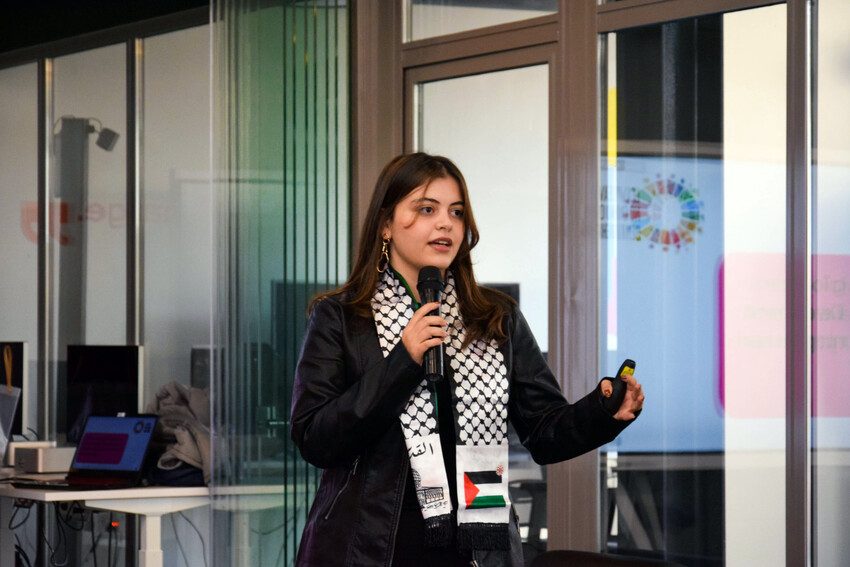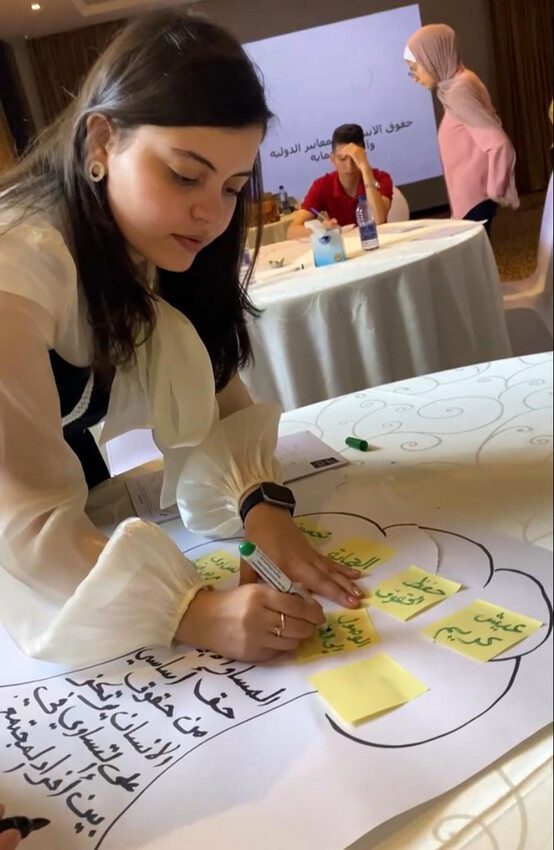Aseel: The future I want is one where education comes above all
Faced with the difficulties of young people trying to obtain an education, Aseel, a youth advocate living in Jordan, imagines a bright and just future.

Aseel joined Plan International’s She Leads project last year, first as a member of the country network, then the UN cohort, and finally as part of the Middle East & North Africa (MENA) Regional Advisory Board, which helped support her campaigning, job and studies.
“My name is Aseel I am of Palestinian descent and live in Jordan,” says the 22-year-old. “I have studied English language and literature and am now doing a master’s in audio-visual translation. I like to describe myself as a daring individual who is never afraid to try new things. I don’t know at what point exactly I started to question my reality, but it was pretty early on, and since then, being an activist has been a natural path for me to take.”
Aseel would like to see a future where education comes first. One where all schools, teachers and children are safe from attack during wars and conflict. An inclusive future, where all children can go to school, regardless of their physical, mental, or developmental status.
Teaching in a refugee camp
“During my studies I had the opportunity to teach English in a Palestinian refugee camp in Jordan on the condition that the teacher (me) should teach in non-traditional ways,” says Aseel. “It was a challenge that I now look on with a lot of admiration, because it was run by university students who at most were 19 at the time!”
“I imagine a future where school is safe, and the right to education is sacred.”
Aseel
“The camp was far from my house, and taking public transportation allowed me the time to take in every detail of life there, and all the difficulties it imposes. Overall the experience opened my eyes to how finances often determine the quality of education you get.
“My first students were 25 girls. I navigated teaching in a way that was creatively challenging, because I feel that passing information in the usual stale way doesn’t work. After all, I was taught that way and it made my school experience a tough one as someone who has ADHD.
“My passion towards the project was fuelled by how much I know the English language is important in this age,” says Aseel. “This world, unfortunately, is not forgiving for those who don’t master it. My students were my little sisters, and in refugee camps, the life of women and young girls is not plain sailing.
“We had to protect our students from harassment on the way home, convince their parents of the English club’s importance when the school started up, and come up with activities that were context-appropriate to fit the limited resources and space we had.”
Shaping a path in advocacy
“In April last year, I joined the She Leads project, first as a member of the country network, then the UN cohort, and finally as part of the MENA Regional Advisory Board, which helped me shape a clear path for my advocacy work that aligns with my job and studies. I gained knowledge from the other activists.
“In August I started doing my MA in audiovisual translation and learning more about accessibility studies and looking into ways of implementing it into everyday life, which adds another layer to my understanding of the problems with our current education systems.
“The future I want is one where education comes above all. Now, more than ever, we need to locate where the problems lie in the system – and they are not hard to find! We must work towards an education that prioritises student needs in the 21st century. The old ways won’t prepare our generation or future ones for the rapid development in tech.”
“The future I want is one where education comes above all.”
Aseel
“It is time we go out of the observer role and become part of the revolution, all children should have languages and tech literacy, not only those who can afford it.”
Safe and inclusive schools
“I imagine a future where school is safe, and the right to education is sacred. No schools should be bombed, teachers should not be the target of attacks, no war should make children miss a whole school year, children should not be hungry, cold, displaced and mistreated, they should not be in lines for hours to get bread or unclean water, children should be in class, playing and learning. I want a future where children are not the target of wars and conflict.
“I imagine a future where schools are designed to include all students, no matter their physical, mental, or developmental status, where they all get educated in the way that works for their condition. Persons with disabilities, hidden or visible, should be treated with dignity and care, and should have the right to pursue higher education.
“I imagine a future where the creativity of children is not overlooked but encouraged and embraced, and where arts, music, and drama are not exclusive to private schools, but are integral parts of the curriculum, and students’ assessment should not only rely on how much they memorise, but how they are able to develop solutions to the problems of everyday life. Children are our future, and I only want to see a bright and just future ahead.”

#FutureGirlsWant
The Future Girls Want campaign (#FutureGirlsWant) aims to amplify Plan International’s advocacy messaging on girls’ rights and equality and get the voices of girls and young people at the forefront of the conversation and in front of decision makers both at the global and national level. This campaign was co-created by young women from the She Leads UN Youth cohort, a group of passionate young advocates that Plan International’s UN Office in Geneva is supporting to engage in advocacy at the international level.
Aseel is a member of the She Leads UN Youth Cohort. The cohort is comprised of 18 young women from Africa and the Middle East, who work together over the course of one year, to do advocacy in important international policy spaces such as the Commission on the Status of Women, the Human Rights Council, and the Summit of the Future.
She Leads is a joint programme from Plan International Netherlands, Defence for Children – ECPAT the Netherlands (DCI-ECPAT), African Women’s Development and Communication Network (FEMNET), and Terre des Hommes the Netherlands (TdH-NL). Equal Measures 2030 is a technical partner. It is implemented in Geneva and New York by Plan International’s UN Offices in Geneva and New York, as well as partner organisations in those spaces. The She Leads programme, which runs from 2021-2025, and is active in 9 countries across Africa and the Middle East aims to increase sustained influence of girls and young women on decision-making and the transformation of gender norms in formal and informal institutions.


